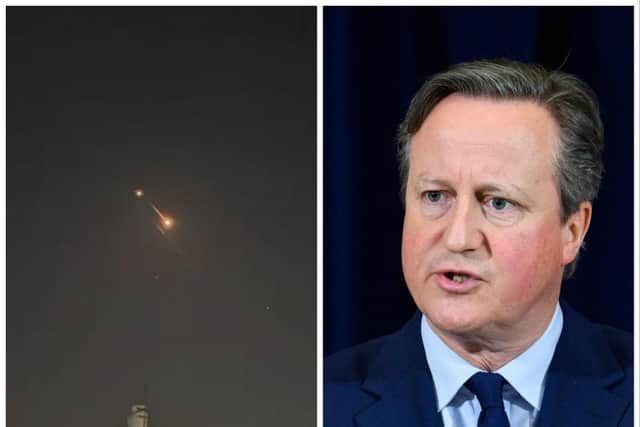David Cameron urges Israel against escalation amid fresh calls for calm over Iran attacks
Foreign Secretary Lord David Cameron said “it is right for Israel not to escalate” after Iran’s unprecedented attack on Israel.
He said on Monday morning: “Israel has every right to respond as an independent sovereign country being attacked in this way.
Advertisement
Hide AdAdvertisement
Hide Ad“But I think we’re very anxious to avoid escalation and to say to our friends in Israel it’s a time to think with with head as well as heart.


“And in many ways this is a double defeat for Iran. Not only was their attack an almost total failure, but also the rest of the world can now see what a malign influence they are in the region and understand their true nature.
“And so I think it is right for Israel not to escalate, but obviously they’re a sovereign, independent country and they’ll make their own decisions.”
He called for a shift in focus away from escalation, and towards Gaza and the release of hostages.
Speaking on Sky News, the Foreign Secretary said: “Our hope is that there won’t be a retaliatory response, and instead the world’s focus should shift to Hamas.
“They still hold those hostages. They’ve been offered a deal that prisoners can be released from Israeli jails in return for some of those hostages and there’ll be a pause in the fighting. That’s what needs to happen next and that’s what I hope we can focus on.”
Uncontrollable escalation
On Sunday, G7 leaders warned an “uncontrollable regional escalation” in the Middle East must be prevented amid simmering tensions after Iran’s unprecedented attack on Israel.
In a joint statement following an urgent call on Sunday, countries including the UK and US said they “stand ready to take further measures now and in response to further destabilising initiatives”.
Advertisement
Hide AdAdvertisement
Hide AdPrime Minister Rishi Sunak earlier confirmed that British RAF jets shot down a number of Iranian drones after the country announced it had launched retaliatory action against its long-standing enemy.
The statement released shortly after the talks on Sunday afternoon said: “We, the leaders of the G7, unequivocally condemn in the strongest terms Iran’s direct and unprecedented attack against Israel.”
It expressed “full solidarity” with Israel and said Tehran had “further stepped toward the destabilisation of the region and risks provoking an uncontrollable regional escalation” which “must be avoided”.
The leaders of the Group of Seven advanced economies also referred to Gaza, where an Israeli offensive, sparked by Hamas’s October 7 attack that claimed the lives of 1,200 people, has caused widespread devastation and killed more than 33,000 Palestinians.
“We will also strengthen our co-operation to end the crisis in Gaza, including by continuing to work towards an immediate and sustainable ceasefire and the release of hostages by Hamas, and deliver increased humanitarian assistance to Palestinians in need,” their statement said.
Israel said Iran launched 170 drones, more than 30 cruise missiles and at least 120 ballistic missiles in an assault that set off air raid sirens across the country.
By Sunday morning Tehran said the attack was over and Israel reopened its air space having said it had intercepted along with its allies 99% of the projectiles launched towards its territory.
The assault came in response to a strike widely blamed on Israel on an Iranian consular building in Syria earlier this month, which killed two Iranian generals.
Advertisement
Hide AdAdvertisement
Hide AdIt is the first direct military attack launched by Tehran on Israel despite enmity dating back to the 1979 Islamic Revolution.
The latest development brought years of shadow war between the two foes out into the open as the conflict in Gaza inflames decades-old tensions in the Middle East.
Speaking to journalists in Downing Street on Sunday morning, the PM described the strikes as “dangerous and unnecessary”, warning that the fallout in regional stability would have been “hard to overstate” if they had been successful.
The UK was one of several countries which helped to counter Saturday’s attack, with additional RAF warplanes deploying over Iraq and Syria, where armed forces were already operating as part of the Operation Shader mission against the so-called Islamic State.
Rescuers said a seven-year-old girl was seriously wounded in southern Israel, apparently in a strike, although they said police were still investigating the circumstances of her injuries.
The Biden administration has indicated it does not want the assault to spiral into a broader military conflict as Israeli war cabinet minister Benny Gantz said the country would “collect a price” for Tehran’s strike.
A top US official said the US had informed Israel it did not plan on striking Iran itself.
All eyes will be on the response from Israel’s Prime Minister Benjamin Netanyahu’s government, with countries in the region and elsewhere urging restraint to avoid intensifying the conflict.
Advertisement
Hide AdAdvertisement
Hide AdMeanwhile, Labour called on the UK to impose “further sanctions” in response to the attack following the G7 call on Sunday afternoon.
Shadow foreign secretary David Lammy suggested the Opposition had been kept abreast on Privy Council terms of the Government’s action overnight but said it was important for the PM to update Parliament on Monday.
Downing Street has not confirmed whether Mr Sunak will address the developments in the Commons, but it is likely a statement will be made.
Comments
Want to join the conversation? Please or to comment on this article.

